Twenty years ago, I read Geraldine Brooks’ book, Year of Wonders, an international bestselling fiction based on the true story of an English village, Eyam, in Derbyshire, that went into voluntary lockdown in 1666, to stop the spread of the bubonic plague to nearby villages.
Somehow – perhaps on a bolt of fabric delivered from London – plague “seeds” as the villagers imagined them, had found their way into Eyam and into the blood of swathes of families who died an agonising death. Today the village is a tourist attraction. You can see the boundary stone, still in place, with its chiselled hollows where the villagers placed their coins in vinegar – to sterilise them – as payment for basic foods and necessary deliveries from surrounding villages. These supplies were left at the boundary stone, and the villagers were not permitted to collect them until the couriers had stepped back to a safe distance.
The lockdown was successful in that the plague didn’t spread beyond Eyam, though history suggests that up to a third of the villagers died during the year of their isolation.
I know that I read the book twenty years ago because I remember that I enjoyed it. I owned a copy and wrote my name and the year I read it on the inside cover. But I could only recall one detail: the boundary stone.
When I ran out of library books to read last week, I rediscovered Year of Wonders on my bookshelves, and was curious to look for resonances with our Covid lockdown experiences, so I turned to page 1 and became totally engrossed.
While I loved the book – again – and marvelled at the corresponding themes (uncertainty, social distancing, conflicting attitudes, the best and worst of humanity, no more spoilers!), what really stunned me was that I couldn’t remember any of the story, apart from the boundary stone. There’s plenty of colour and drama, but not one single moment had stayed with me. I had no idea, as I turned the pages, what might happen next.
How can such vivid experiences, whether they’re books we’ve read, movies we’ve seen, or actual first-hand life experiences, leave no memorable trace?
When I was about seven or eight years old and learning to do handstands in the school playground at recess, I asked my mother if she could do a handstand when she was a little girl. I was eager to progress to walking several paces in handstand, and I guess I was looking for encouragement. I was shocked when Mum laughed and said, “How would I know! It was too long ago!”
I remember that moment as if it were yesterday, though in fact it was perhaps almost 60 years ago. The shock, the emotional impact of the sudden knowledge that memories could be lost, anchored into my psyche. While that remains, I can’t tell you whether I acquired the skill of walking on my hands. I suspect that I managed two or three tottering paces, but I’m just guessing.
In a similar vein, my sister and I remember the emotional impact of sad news that we received when we were very small, I was six, she was four. We each remember exactly where we were at the time the news was delivered. We were together, but my memory of place is different from her memory. While we understand that memories are not reliable, we both marvel that – were our memories of place uncontested – we would each be certain that we were correct.
Dreams – yes, perhaps you were wondering when I would make a connection with dreams – reveal our conscious and unconscious experiences, but you’re more likely to encounter your emotional memories (the shock of my mother’s handstand announcement, the grief my sister and I experienced). In interpreting your dreams you’re able to witness the patterns of behaviour, attitudes, and beliefs that these emotional experiences set into motion. People and places from your past might appear in your dreams in various morphed and surreal forms, but the underlying emotional experiences and their effect on your mindset are easier to trace and enlightening to reveal.
When you discover how your past has shaped your present, you may be able to predict the general shape of your future unless you make a change.
Dream work can help inform the changes you might make and how these might impact the shape of things to come.
A friend, Jessica Adams, a well-known astrologer, told me that the astrological lay of the stars at the time of the 1665-6 plague was very similar to that at the time of Covid. What goes round, comes round. While I’m not an astrologer, I do know that in terms of our individual mindsets, what goes round, comes round, unless we make a change.
I was keen to read Year of Wonders, to immerse in the wonder of how much we can forget, and to compare notes between 2020/21 and 1666.
Oh, and one last dream interpretation note to impart before I leave you to rush off and read the book: How often do the characters or scenarios in a book that you are engrossed in turn up in your dreams? How often do your dreams take up a theme or conflict from a movie or box set that you’ve been watching before sleep? Often, right?
People say, ‘Oh, I only dreamed about that because I saw the movie before I fell asleep’, or ‘I fell asleep mid-chapter and my dream continued the story’.
The dream, they feel, was interesting, noteworthy, but not interpretable. But no! Think again! One of the functions of dreaming is to problem-solve, to resolve issues. Your dreaming mind might take on board a problem or theme from a book or movie and work it through, looking for resolution. And guess what? It’s your unique mindset (both conscious and unconscious) that sets about problem-solving in your dream, so when you interpret the dream, you discover more about that mindset of yours: enlightening information that you can put to good use.
On top of that, any book or movie characters, issues, conflicts, or events that resonate with your own issues, conflicts, or experiences, may feature in your dreams as symbols of your own inner stuff.
We’ve all experienced – or are still experiencing – varying degrees of lockdown, but if you’re curious to step back in time some 455 years and compare notes through reading Year of Wonders, your dreams might surprise you.


